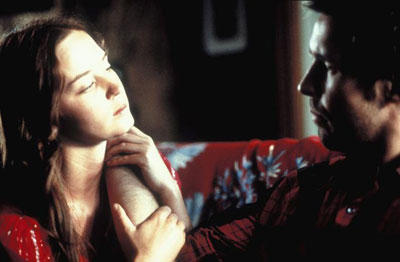
I gather My Summer of Love has been out in Britain for a while, and might even be on video there now, but it just opened this past weekend in Canada. I caught it at a press screening a week and a half ago — and since I didn’t jot my thoughts down at the time, my memories of it have already faded somewhat since then — but I do remember thinking it was an interesting little flick, at least where the relationship between the two women is concerned.
However, I can’t say I cared for the film’s treatment of religion or Christianity. Apparenty the main character’s born-again brother Phil, played by In America‘s Paddy Considine, is not in the original novel and was added to the story by director Pawel Pawlikowski — and since this character is a big, big part of the film, I can only wonder what the original story did without him. But the thing that gets at me is not the depiction of this particular character, per se, but the depiction of the other Christians around him.
We are supposed to believe that Phil just got out of prison, and that he found God in there. But how did he find him? Is there a discipler, or spiritual director, in Phil’s life — someone he might be accountable to? As far as the film is concerned, there sure doesn’t seem to be; instead, once he’s out of prison, Phil begins hosting meetings and leading various initiatives, and the other Christians just follow him around, like a mass of anonymous faces.
Did they all convert because of Phil, and does this explain why they let him do whatever he does, even when it is highly questionable and the sort of thing that might ordinarily provoke some debate (such as shutting his grown-up sister inside her room)? Doubtful, as there probably hasn’t been enough time for Considine to create so many of his own followers from scratch. Were they all Christians before him, then? Doubtful, since they seem, if anything, even less mature in the faith — though that may be because they are less developed as characters in general.
Considine has said that he researched the role by attending an Alpha course, and I think his performance is as authentic as it can be, given the demands of the script. But there is a scene near the end of the film where a woman almost seduces Phil, and then she laughs and says, “You’re too easy!” And that is how I feel about the film’s portrayal of faith in general — the director has made it “too easy” to expose these characters as frauds and dupes, etc.
But I gather some people disagree and think this film rings true anyway. Feel free to try to persuade me I’m wrong.












